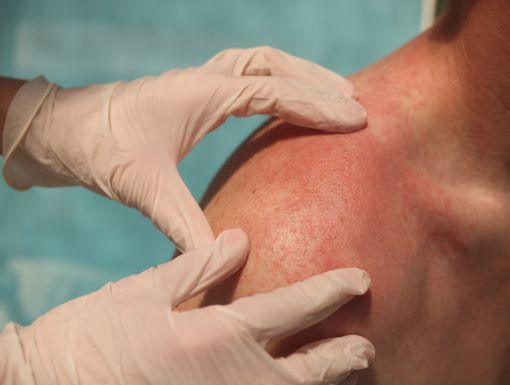
Top 4 Cancer Screenings for Men
Preventative screenings are one of the most important things we can do to fight cancer. Screenings allow us to identify a problem before any symptoms or signs have appeared, when cancer may be easier to treat. Screenings also give doctors the opportunity to treat cancers before they have grown or spread to other parts of the body.
Like having an annual physical or getting a flu shot, certain cancer screenings should be integrated into your regular health routine especially as you get older. This is particularly important for men. Men have higher rates of getting cancer than women do, and they are more likely to die from cancer.
According to the American Cancer Society, there are four screenings every man should get to help prevent cancer.
Colorectal Cancer Screening
Colorectal screening tests find polyps so they can be removed before they turn into colorectal cancer. This is one cancer that you can actually prevent through testing!
There are multiple tests that screen for colon and rectal cancer. Some can be taken at home, while others need to be done by your doctor. Colonoscopies are also important for catching cancer. A major development in the field of public health and cancer prevention took place on May 18, 2021 when the U.S. Preventive Services Task Force provided updated recommendations regarding the age to begin screening for colorectal cancer. Adults should initiate screening for colorectal cancer at the age of 45, according to the new guidelines. This is a significant change by the task force, which previously recommended in its 2016 guidelines that screening for this cancer begin at the age of 50. Anyone with a family history of colorectal cancer should be screened earlier. For men in good health and with a life expectancy of more than 10 years, colorectal cancer screenings should be continued through the age of 75.
Prostate Cancer PSA Lab Test
Prostate cancer is the most common male cancer worldwide. In the U.S., 1 in 7 men will be diagnosed with prostate cancer in their lifetime.
The US Preventative Services Task Force recommendations suggest that clinicians should inform men ages 55 to 69 about the potential benefits and harms of PSA–based screening for prostate cancer. While the final decision should rest with the individual person, men should discuss the pros and cons of prostate cancer testing with their physician in order to make an educated choice.
The American Urological Association, the American Society of Clinical Oncology and the National Comprehensive Cancer Network all have some form of recommendation for physicians to weigh the risks and benefits of screening on an individual basis. This includes taking into account family history, race and other risk factors and then proceeding with measuring PSA only after a discussion with the patient. A Prostate-Specific Antigen (PSA) test is a simple blood test that only takes a few minutes. This test checks the level of PSA in your blood since the blood level of PSA is often elevated in patients with prostate cancer.
Early detection is key in the fight against cancer. Learn more and schedule your screenings at https://digital.ochsner.org/cancer-screenings/
Lung Cancer CT Scan
Any man between the ages of 55 to 75 that is currently a smoker or was a heavy smoker should speak with their doctor to determine if a CT scan is right for them. There are usually no symptoms from lung cancer until after the cancer has advanced. Lung cancer is often difficult to treat because by the time you notice the symptoms, it has often spread to other areas of the body. This is one of the reasons that lung cancer causes the most cancer deaths worldwide, and why it is so important to get screened so it can be caught early.
Lung cancer can be treated more effectively when it is discovered early on. If lung cancer is caught before it spreads, the percentage for surviving more than five years increases by nearly 60%.
Skin Cancer
All men should be familiar with their skin and look out for changes in moles, spots or skin discolorations. It is also important that you wear sunscreen and a hat while working outdoors to protect your skin from the sun’s harmful UV rays.
Skin cancer can develop anywhere on the body. When checking yourself, take note of all the spots on your body: moles, freckles and age spots. If you find unusual spots, the next step is to set up a skin cancer screening with a dermatologist. Your doctor may choose to biopsy an abnormal area by removing part of it in the office and having it tested for cancer. When caught and removed early, skin cancers are almost always curable.
Editor's note: This article was originally published on June 6th, 2017.


